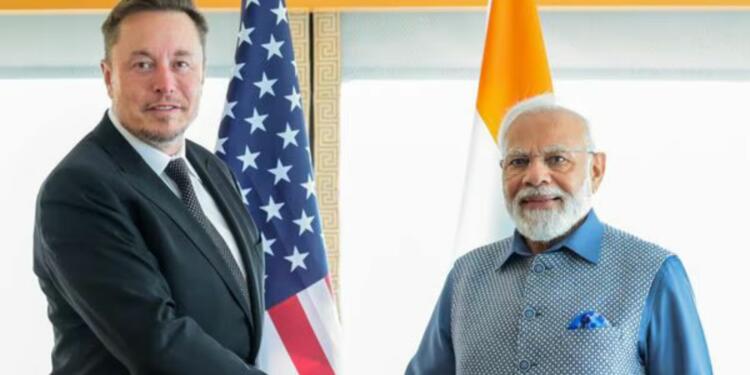Elon Musk’s impending visit to India has stirred a wave of anticipation, with expectations running high for major announcements regarding Tesla’s entry into the Indian market and the expansion of Starlink operations. Scheduled to land on April 21 and meet with Prime Minister Narendra Modi on April 22, Musk’s visit coincides with a crucial moment in India’s technology and automotive landscape. Amidst speculation about Tesla’s manufacturing plans and Starlink’s regulatory clearance, the visit holds significant implications for India’s economy and global technological footprint.
Tesla’s Entry into the Indian EV Market
Elon Musk’s visit to India is poised to mark a significant milestone as Tesla gears up to formally enter the Indian electric vehicle (EV) market. While specifics about factory locations remain speculative, anticipation runs high for Musk’s announcement regarding Tesla’s presence in India. Plans are underway to manufacture budget EVs tailored for the Indian market, alongside premium models destined for export markets. India’s burgeoning EV demand and potential as a manufacturing hub have captured Tesla’s interest, driving the company to explore opportunities in the region. With Musk’s visit symbolizing a strategic move towards tapping into India’s automotive landscape, the stage is set for Tesla to make a lasting impact on the country’s EV sector and reinforce its global footprint.
Starlink’s Operations in India
Reports indicate a significant advancement for Starlink’s operations in India as the Department of Telecommunications (DoT) has reportedly granted preliminary approval. Ahead of Elon Musk’s visit, regulatory processes are being fast-tracked, awaiting final approval from the Home Ministry. This proactive approach underscores India’s eagerness to embrace innovative technologies and expand its connectivity infrastructure.
Elon Musk’s agenda during his visit is expected to include crucial discussions on Starlink’s deployment strategy and addressing security concerns associated with satellite internet services in India. Given the sensitive nature of telecommunications and data privacy, these discussions will likely be pivotal in shaping Starlink’s approach to navigating regulatory frameworks and ensuring compliance with Indian laws.
The potential for Starlink to revolutionize internet connectivity in India holds immense promise, particularly in rural and remote areas where traditional infrastructure is lacking. Musk’s engagement with Indian officials presents an opportunity to outline Starlink’s vision for bridging the digital divide and empowering communities with reliable, high-speed internet access.
As India accelerates its digital transformation initiatives, the arrival of Starlink could catalyze progress towards achieving universal internet connectivity and driving economic development. However, addressing security concerns and ensuring regulatory compliance will be paramount to fostering trust and securing widespread adoption of Starlink’s services.
Tesla’s Existing Engagement with Indian Suppliers
Tesla’s robust engagement with Indian suppliers underscores its significant presence in the country’s automotive ecosystem. Currently, Tesla sources auto parts valued at a staggering $1 billion annually from India, reflecting a substantial reliance on Indian manufacturers for its global operations. This substantial figure highlights the integral role that Indian suppliers play in Tesla’s supply chain strategy.
Collaborating with over 30 automotive part makers, Tesla’s network comprises a diverse mix of Indian and multinational companies with operations in India. This collaboration extends beyond mere transactional relationships, emphasizing long-term partnerships aimed at ensuring quality, reliability, and scalability of supply. Through these collaborations, Tesla leverages the expertise and capabilities of Indian suppliers to meet its stringent quality standards and production requirements.
Recent strategic agreements, such as the semiconductor supply deal with Tata Electronics, further demonstrate Tesla’s commitment to fostering enduring partnerships with Indian suppliers. This partnership not only signifies Tesla’s confidence in Tata Electronics’ capabilities but also signals a broader commitment to leveraging India’s semiconductor manufacturing prowess for its global operations. Such agreements highlight Tesla’s proactive approach to securing its supply chain and mitigating risks associated with global disruptions.
Also Read: Tesla Ready to Arrive India and Indian Government’s “Atithi Devo Bhav”
Implications for India’s Automotive Industry
Tesla’s growing engagement with India’s automotive industry carries significant implications, aligning with the government’s agenda for local manufacturing and self-reliance. The increased sourcing of auto parts worth $1 billion annually from India reflects Tesla’s confidence in the country’s manufacturing capabilities and signals a positive trajectory for India’s automotive sector.
Policy shifts, including the reduction in import tax for electric vehicles (EVs), have provided impetus for Tesla to explore local production. This move not only aligns with India’s efforts to promote clean energy and reduce dependence on fossil fuels but also presents a strategic opportunity for Tesla to establish a stronger foothold in the Indian market. By considering local production, Tesla stands to benefit from reduced costs and streamlined supply chains, further bolstering its competitiveness in the region.
The surge in auto ancillary stocks indicates market optimism driven by Tesla’s integration of Indian-made components. As Tesla expands its sourcing from India and explores opportunities for local production, ancillary suppliers stand to gain from increased demand for their products and services. This surge reflects investor confidence in the growth prospects of India’s automotive ecosystem and underscores the positive ripple effects of Tesla’s presence in the country.
Prospects for Tesla’s Manufacturing Unit
Tesla’s prospects for establishing a manufacturing unit in India hold considerable promise, with discussions underway with several states to identify suitable locations for production facilities. States such as Rajasthan, Gujarat, Tamil Nadu, Maharashtra, and Telangana have emerged as frontrunners in these discussions, offering various incentives and infrastructure support to attract Tesla’s investment.
Access to ports is a critical factor that may influence Tesla’s choice of location for its manufacturing unit. Maharashtra and Tamil Nadu, with their well-developed port infrastructure, hold natural advantages in this regard. The availability of efficient logistics networks and proximity to export hubs would streamline Tesla’s operations and facilitate the transportation of goods to both domestic and international markets.
Furthermore, the potential relocation of part of Tesla’s supply chain from China to India could herald a significant transformation in the automotive manufacturing landscape. As Tesla seeks to diversify its supply chain and reduce dependence on any single region, India emerges as an attractive alternative for sourcing components and raw materials. This shift not only mitigates risks associated with global disruptions but also presents opportunities for Indian suppliers to expand their presence and contribute to Tesla’s global supply network.
In Conclusion, Elon Musk’s visit to India holds immense significance for both Tesla and Starlink, as they prepare to make major announcements regarding their operations in the country. With expectations running high for Tesla’s entry into the Indian EV market and Starlink’s deployment of satellite internet services, Musk’s visit marks a pivotal moment in India’s technological trajectory. As discussions unfold and plans materialize, the outcomes of Musk’s meetings with Indian officials are poised to shape the future of India’s automotive and telecommunications sectors.
Also Read: China’s Regressive Stance on Tesla EV in India: Fear or Strategic Maneuvering?
























